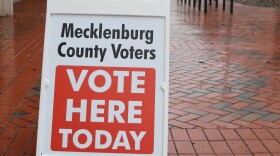New guidelines for voting adopted by the state elections board's Republican majority might conflict with state law. Under the newly adopted rule, around 98,000 North Carolina voters previously eligible to cast regular ballots in state and local elections might now have to vote provisionally.
As required under the federal Help America Vote Act of 2002, these 98,000 voters provided either a driver's license number or last four digits of their Social Security Number when registering. But, for a host of reasons, that number was not validated because it didn't match with a government database.
Under state law, a registered voter in that position would have to provide a so-called HAVA document, such as a utility bill, with name and address on it, when first presenting to vote after registering.
At that point, the voter's eligibility would be confirmed and they would be listed as active and entitled to cast regular ballots.
However, at a meeting on Wednesday, the bipartisan state board voted 3-2 along party lines to list these 98,000 voters as inactive until each one gets their driver's license or last four digits of their Social Security Number validated. Until then, that voter would remain listed as inactive and compelled to cast a provisional ballot.
To be counted, provisional ballots require follow-up steps for the voters who cast them and extra review by local elections boards.
In his rationale for moving to adopt the guidance memo, Republican board member Stacy Eggers said it would instruct local elections officials on how to treat such voters.
"And that it will essentially help us collect the missing information, verify that missing information, and, at the same time, allow voters to proceed and comply with HAVA, and also our state law and state Constitution obligations," Eggers added.
But Siobhan Millen, one of the board's two Democrats, said adding this requirement places an undue burden on voters, especially women.
"Or people who change their name, you have a new duty, potentially, now," Millen warned. "If your voter record says one thing and you provide a social that you got when you were a teenager working at the fry shop that says a different name, it may not verify, if I'm correct."
The state elections board's general counsel, Paul Cox, confirmed Millen's suspicions about what might be behind a voter being put into this inactive pool.
"What happens when you do a database match is that you have to match exactly on first name, last name, date of birth, and either driver's license or last four of your social," Cox explained to the board.
And Cox said any discrepancy would render the registration information invalid.
"If there's a maiden name in one database and a married name in another database it won't match," he said. "If you have a name that one database used as your last name and another database uses your middle name, then it won't match; if you have a record where someone erroneously transposed numbers for your date of birth, it won't match."
According to Cox, those are the typical reasons why an otherwise valid voter might have this discrepancy in their registration records. Voter fraud, he added, is not typical.
"It's conceivable also that somebody provided you false information and it doesn't validate for that reason, but I don't have any indication to the extent that that's happening," Cox told the board.
In backing the proposed guidance memo, board member Stacy Eggers evoked the recent disputed state Supreme Court race between Republican Jefferson Griffin and Democratic incumbent Allison Riggs. Griffin lost the close race by a little more than 700 votes. But he tried to overturn the results through state and federal litigation.
"Mr. Chairman, I don't know the better way for us to accomplish this goal, and I certainly don't want to expose us to another Griffin-and-Riggs type of a situation," Eggers, referring to the state elections board's efforts to clear up registration issues, said before the vote on adopting the memo.
Griffin, himself a judge on the North Carolina Court of Appeals, tried to have the courts throw out more than 65,000 ballots due to alleged irregularities. He claimed that more than 60,000 ballots of early in-person and mail-in voters should be tossed because or missing information in their registration records.
Ultimately, a federal district court judge dismissed Griffin's case and ordered the state elections board to certify Riggs' victory. However, state appellate courts had sided with Griffin on some issues and instructed the state elections board to take steps to clean up discrepancies in voters' registration records.
As part of that process, the state elections board launched a Registration Repair Project. The project identified more than 103,000 voters whose registration records were missing either a driver's license number or last four digits of their Social Security Number. Through outreach efforts, that number has been whittled down to a little more than 82,000 voters.
However, the 98,000 voters covered by the guidance memo adopted this week come from an entirely new class of voters. These voters' records do have one of the numbers required by HAVA--unlike the voters challenged by Griffin--but for a host of administrative or clerical reasons, their numbers didn't get validated through a database match.
Now, even though state law says these voters are eligible to cast regular ballots once they've presented a HAVA ID, they will have to vote provisionally until they take whatever steps needed to correct the discrepancies in their registration records.
"So, you're going to continue to be notated on the voter rolls as a person who needs to provide HAVA ID every time you come and vote, so, just be ready," Democratic board member Millen said.
The state elections board recently changed from a Democratic 3-2 majority to a GOP tilt. The GOP-controlled legislature rewrote the law to move authority over elections board appointments from the governor's office, now held by Democrat Josh Stein, to the office of State Auditor Dave Boliek, a Republican.







